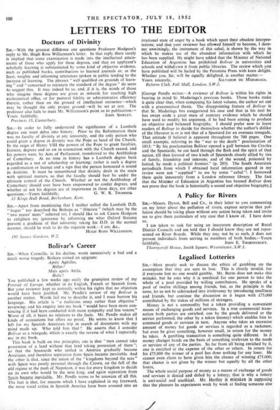Bolivar's Career
SIR,—When Corneille, in his decline, wrote successively a bad and a much worse tragedy, Boileau coined an epigram: A pres Agesilas,
Hilas !
Mais apres Attila.
Hola !
You published a few weeks ago easily the grumpiest review of my Portrait of Europe, whether in its English, French or Spanish form. But your reviewer kept so correctly within his rights that no objection would have been justified. Mr. Pendle's review of my Bolivar is another matter. Words fail me to describe it, and I must borrow his language. His article is "a malicious essay rather than objective" reviewing; and his enquiry into my book "would have been more con- vincing if it had hen conducted with more sympathy and less venom." Worst of all, it bears no relations to the facts. Mr. Pendle makes all kinds of accusations but offers no proof. He seems to know that I left for my Spanish American trip in search of documents with my mind made up. Who told him that ? He asserts that I consider Bolivar as a renegade, which is exactly the reverse of what I repeatedly say in my book.
This book is built on two principles; one is that "men cannot take possession of a land without that land taking possession of them "; so that the Spaniards who settled in America gradually became American, and therefore separation from Spain became inevitable. And the other is that, since the union of the "kingdoms beyond the seas" with Spain was purely personal through the Crown, on the fall of the old regime at the push of Napoleon, it was for every kingdom to decide on its own who would be the next king; and again separation from Spain became inevitabk. Mr. Pendle seems to be unaware of all this. The fact is that, for reasons which I have explained in my foreword, the more vocal critics in Spanish America have been aroused into an irrational state of anger by a book which upset their obsolete interpre- tations; and that your reviewer has allowed himself to become, I dare- say unwittingly, the instrument of this cabal, is shown by the way in which he makes use of the abundant information with which he has been supplied. He might havg added that the Minister of National Education of Argentina has prohibited Bolivar in universities and schools and withdrawn it from public libraries. The review which you have published will be hailed by the Peronista Press with keen delight. Whether you, Sir, will be equally delighted, is another matter.— [George Pendle writes:—A reviewer of Bolivar is within his rights in bearing in mind Sr. Madariaga's previous books. Those books make it quite clear that, when composing his latest volume, the author set out with a preconceived thesis. The disappointing feature of Bolivar is that Sr. Madariaga has exaggerated his case and that in his zeal he has swept aside a great mass of contrary evidence which he should have used to modify his argumelt, if he had been aiming to produce an objective and balanced biography. I should prefer now to leave readers of Bolivar to decide for themselves whether the author's dislike of the liberator is or is not that of a Spaniard for an overseas renegade. That attitude (I believe) is apparent throughout the 700 pages. One small example, referring to the "war to the death" proclamation of 1813: "By his proclamation Bolivar opened a gulf between the Creoles and the Spaniards; he cut hard through. the flesh and the spirit of that nation, till then formed of two kinds of Spaniards closely allied by ties of family, friendship and interests; and of the wound, poisoned by hatred, he made a political frontier." (p. 203). The South American periodicals from which I obtained local information quoted in my review were not " supplied " to me by some "cabal ": I borrowed them quite innocently from a London reference library. The fact that the Minister of Education in Argentina has banned Bolivar does not prove that the book is historically a sound and objective biography.]


































 Previous page
Previous page